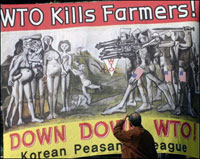Farmers, workers confront the WTO
By
LeiLani Dowell
Published Dec 24, 2005 7:54 AM
Thousands converged in Hong Kong from around
the world to protest the six-day meeting of the World Trade Organization which
ended Dec. 18. After fierce battles in the streets surrounding the Hong Kong
Convention Center where the meeting was held, police arrested and detained over
900 protesters. The Hong Kong People’s Alliance reports that some 60
demonstrators suffered injuries at the hands of the police; three were
hospitalized.
|
Banner from Korean Peasants League.
|
According to Action Aid, the WTO “sets the rules of
international trade and also acts as a policeman, forcing countries to open up
their markets under the threat of economic and political
sanctions.”
An eyewitness report from Pranjal Tiwari and David
Solnit on Dec. 17 describes the protests as “the most intense street
battle that we have ever seen.... Farmers, workers, women’s organizations,
fisher folk, Hong Kong youth, migrants and other movement people from Korea,
across Asia and around the world marched on, broke through several police lines
to less than a block from the site of the WTO conference center and laid siege
to it until we were dispersed with teargas and mass arrests tonight.
...
“Contrary to what media reports might say, the confrontations
have been anything but chaotic. Korean groups led veritable battles against the
police with their well-organized, incredibly courageous and militant
resistance.... The police were out-organized, inexperienced, and unable to
contain the huge numbers of people that broke through their lines on numerous
fronts in the Wan Chai district.... Hong Kong residents, increasingly supportive
of anti-WTO demonstrations throughout this week, lined the streets, some
cheering, giving thumbs-up, and even handing out snacks and water to
demonstrators....
“The migrant workers had a mobile sound system and
alternately led chants and songs in Bahasa Indonesia, English, and
Cantonese....The Koreans were tight units of seasoned activists, who had been
involved in the fiercest and most militant worker, student and farmer struggles
in the world over many decades. They were both intensely organized, like an army
without the rigidity, and very politically focused - chanting and singing their
message and wearing clear messages on their matching ‘WTO Kills
Farmers’ vests, hats, headbands, and many with red signs attached to their
front and back.”
Tiwari and Solnit’s report also includes text
from a document handed out by the Korean Peasants League-“Citizens of Hong
Kong! Food is not a commodity. Agriculture is not a business opportunity. If
agriculture is liberalized, we will be pushed down the slippery slope of
liberalizing education, services and everything people need to enjoy as basic
rights will be taken away and provided only to the wealthy....Defending
agriculture is the way to defend our collective future”-and the Assembly
of the Poor in Thailand-“We are Assembly of the Poor, an alliance from
Thailand representing 19 networks of struggling poor and urban people, farmers,
fisherfolk, people living with HIV/ AIDS, workers, and landless peasants. We are
affected by the trade liberalization and are made losers in the unfair game that
those people in the convention center are trying to make even worse. We are in
Hong Kong to make our voice heard and call for a fair world.... It is not easy
for us to be here in Hong Kong; in a different climate, with a different
language, leaving our families behind. We have no choice.... despite obstacles,
we vow to move forward. We, Assembly of the Poor, will work together with La Via
Campesina, to stop this unfair negotiation until the very end.”
In
an attempt to prevent the collapse of talks that occurred at the WTO meeting two
years ago in Cancún, Mexico, leaders of the richest imperialist nations
made a few paltry concessions to poorer nations, their farmers and peasants,
such as an agreement to get rid of tariffs or quotas on imports for 97% of goods
from the world’s poorest countries. The 3% left out of this agreement,
however, includes key products in many poor countries, such as cotton.
While the United States, European Union and Japan agreed to provide
billions in development aid, most of the aid is in the form of loans, not
grants, has in actuality already been promised, and will no doubt be tied to the
WTO’s “restructuring” rules for the countries in need. And
while the text on service privatization was scaled back somewhat thanks to the
intervention of Venezuela and Cuba, it is predicted that the attempt to make
privatization of services mandatory for most developing countries will be raised
again at the next meeting in Geneva.
In a statement denouncing the
meeting’s outcome, the South African labor federation COSATU said,
“The developed countries once again failed to extend a hand of solidarity
to the poor.... The situation will remain that it would be better to be a cow in
Japan, subsidized for $7 per day, than to be a human being living in
Africa.”
Articles copyright 1995-2012 Workers World.
Verbatim copying and distribution of this entire article is permitted in any medium without royalty provided this notice is preserved.
Workers World, 55 W. 17 St., NY, NY 10011
Email:
[email protected]
Subscribe
[email protected]
Support independent news
DONATE


